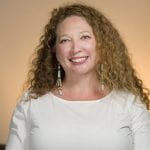Conference presenters
Clarita Lefthand-Begay
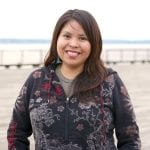 Clarita Lefthand-Begay is citizen of the Navajo Nation and an assistant professor in the University of Washington’s Information School. Her interdisciplinary research focuses on the protections (e.g., tribal codes, laws, guidelines, declarations, etc.) for indigenous knowledge in the United States, tribal water security, and climate health and resiliency. Indigenous knowledge systems are foundational to each of her projects. She is currently the Director of the Tribal Water Security Project, a project that examines the water insecurity challenges faced by tribes in the United States and around the globe. As a researcher and tribal community member, Clarita supports efforts to strengthen tribal wellbeing while respecting and honoring self-determination and cultural revitalization.
Clarita Lefthand-Begay is citizen of the Navajo Nation and an assistant professor in the University of Washington’s Information School. Her interdisciplinary research focuses on the protections (e.g., tribal codes, laws, guidelines, declarations, etc.) for indigenous knowledge in the United States, tribal water security, and climate health and resiliency. Indigenous knowledge systems are foundational to each of her projects. She is currently the Director of the Tribal Water Security Project, a project that examines the water insecurity challenges faced by tribes in the United States and around the globe. As a researcher and tribal community member, Clarita supports efforts to strengthen tribal wellbeing while respecting and honoring self-determination and cultural revitalization.
Kirby Brown
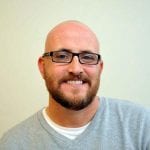 Kirby Brown is an Associate Professor of Native American Literatures in the Department of English at the University of Oregon and an enrolled citizen of the Cherokee Nation. He received his PhD in English from the University of Texas at Austin in 2012. His research interests include Native American literary, intellectual, and cultural production from the late eighteenth century to the present, Indigenous critical theory, sovereignty/self-determination studies, nationhood/nationalism studies, modernism/modernity studies, and genre studies. His book, Stoking the Fire: Nationhood in Cherokee Writing, 1907-1970 (University of Oklahoma Press, 2018), examines how four Cherokee writers variously remembered, imagined and enacted Cherokee nationhood in the period between Oklahoma statehood in 1907 and tribal reorganization in the early 1970s. It was awarded an Andrew W. Mellon grant in 2017.
Kirby Brown is an Associate Professor of Native American Literatures in the Department of English at the University of Oregon and an enrolled citizen of the Cherokee Nation. He received his PhD in English from the University of Texas at Austin in 2012. His research interests include Native American literary, intellectual, and cultural production from the late eighteenth century to the present, Indigenous critical theory, sovereignty/self-determination studies, nationhood/nationalism studies, modernism/modernity studies, and genre studies. His book, Stoking the Fire: Nationhood in Cherokee Writing, 1907-1970 (University of Oklahoma Press, 2018), examines how four Cherokee writers variously remembered, imagined and enacted Cherokee nationhood in the period between Oklahoma statehood in 1907 and tribal reorganization in the early 1970s. It was awarded an Andrew W. Mellon grant in 2017.
Mark Carey
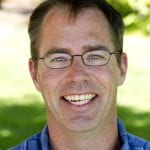 Mark Carey is Professor of History and Environmental Studies, and Director, Environmental Studies Program. His initial research was on Latin American environmental history, particularly on climate history and glacier disasters in the Peruvian Andes. This work culminated in his book, In the Shadow of Melting Glaciers: Climate Change and Andean Society (2010) which won the Elinor Melville Prize for best book in Latin American environmental history. More recently, his work has analyzed glaciers, climate change, water, and indigenous knowledge in high-mountains globally and in the Polar Regions, particularly Greenland and Antarctica. His other books are The High-Mountain Cryosphere: Environmental Changes and Human Risks (2015, edited by Christian Huggel, Mark Carey, John J. Clague, and Andreas Kääb) and Glaciares, Cambio Climático y Desastres Naturales: Ciencia y Sociedad en el Perú (2014). Carey co-directs the Climate Change and Indigenous Peoples Initiative.
Mark Carey is Professor of History and Environmental Studies, and Director, Environmental Studies Program. His initial research was on Latin American environmental history, particularly on climate history and glacier disasters in the Peruvian Andes. This work culminated in his book, In the Shadow of Melting Glaciers: Climate Change and Andean Society (2010) which won the Elinor Melville Prize for best book in Latin American environmental history. More recently, his work has analyzed glaciers, climate change, water, and indigenous knowledge in high-mountains globally and in the Polar Regions, particularly Greenland and Antarctica. His other books are The High-Mountain Cryosphere: Environmental Changes and Human Risks (2015, edited by Christian Huggel, Mark Carey, John J. Clague, and Andreas Kääb) and Glaciares, Cambio Climático y Desastres Naturales: Ciencia y Sociedad en el Perú (2014). Carey co-directs the Climate Change and Indigenous Peoples Initiative.
Marta Lu Clifford
Marta Lu Clifford, tribal elder and member of The Confederated Tribes of Grand Ronde (Chinook, Cow Creek, Cree), currently serves as the Elder-In-Residence for University of Oregon’s Native Theatre and coordinates the Native Play Reading Series at UO’s Many Nations Longhouse. In 2011 played Rose in the University Theatre’s production of Salmon Is Everything and in 2019 she played Nana in the production of The Home Planet. She is currently collaborating on a new play, WaterWays, about indigenous water concerns in Oregon. When she’s not busy with Native theatre she works full-time as a Procurement Counselor with the Oregon Procurement Technical Assistance Center in Springfield, Oregon.
Mishuana Goeman
Dr. Mishuana Goeman, Tonawanda Band of Seneca, is an Associate Professor of Gender Studies, Chair of American Indian Studies Interdepartmental Program, Associate Director of American Indian Studies Research Center, and the Special Advisor to the Chancellor on Native American and Indigenous Affairs at UCLA. She is the author of Mark My Words: Native Women Mapping Our Nations (University of Minnesota Press, 2013) and the forthcoming Settler Aesthetics and the Spectacle of Originary Moments: Terrence Malick’s the New World (University of Nebraska Press). She is a Co-PI on two community based digital projects, Mapping Indigenous L.A (2015), which gathers alternative maps of resiliency from Indigenous LA communities, and Carrying Our Ancestors Home (2019), a site concentrating on better working tribal relationships and communications as it concerns repatriation and NAGPRA. Book chapters are included in Theorizing Native Studies (Duke University Press, 2014), Sources and Methods in Indigenous Studies (Routledge 2016), Macmillan Interdisciplinary Handbooks: Gender: Sources, Perspectives, and Methodologies (2016), Critically Sovereign: Indigenous Gender, Sexuality, and Feminist Studies (Duke University Press, 2017) and a forthcoming chapter in Biopolitics – Geopolitics – Life: Settler-colonialism and Indigenous Presences (Duke University Press). She also publishes widely in peer-reviewed journals, including guest edited volumes on Native Feminisms and Indigenous Performances.
Emily West Hartlerode
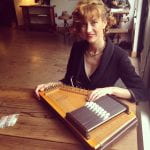 Emily West Hartlerode is Associate Director of the Oregon Folklife Network. She has an MA in Folklore and certificate in Gender Studies from UO where she trained in feminist ethnographic fieldwork, and documentary filmmaking. West Hartlerode has produced fiction films and documentaries, both feature-length and shorts. Her documentary topics range from women rock musicians to inmate crochet communities, from traditional artists to Native archivists. Her collaborations include a promotional video for the National Parks Service-sponsored “Honoring Tribal Legacies” guide, and the 38th Annual American Indian Youth Camp. West Hartlerode currently manages NEA-funded projects like the Traditional Arts Apprenticeship Program and the Technical Assistance Collaboration Grants.
Emily West Hartlerode is Associate Director of the Oregon Folklife Network. She has an MA in Folklore and certificate in Gender Studies from UO where she trained in feminist ethnographic fieldwork, and documentary filmmaking. West Hartlerode has produced fiction films and documentaries, both feature-length and shorts. Her documentary topics range from women rock musicians to inmate crochet communities, from traditional artists to Native archivists. Her collaborations include a promotional video for the National Parks Service-sponsored “Honoring Tribal Legacies” guide, and the 38th Annual American Indian Youth Camp. West Hartlerode currently manages NEA-funded projects like the Traditional Arts Apprenticeship Program and the Technical Assistance Collaboration Grants.
Kevin Hatfield
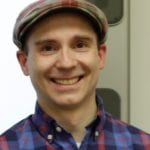 Kevin Hatfield is an Adjunct Assistant Professor in the Department of History and Robert D. Clark Honors College. His research and scholarship focuses on the Bizkaian Basque community of eastern Oregon, Western Idaho, and northern Nevada; and the Northern Paiute communities of the Confederated Tribes of Warm Springs and Burns Paiute Tribe. Hatfield developed an undergraduate curriculum engaging students in decolonizing pedagogy and community-engaged research with indigenous and ethnic community course partners. For the past six years he has co-instructed an annual Clark Honors College research colloquium, “Decolonizing Research: The Northern Paiute History Project,” with Jennifer O’Neal.
Kevin Hatfield is an Adjunct Assistant Professor in the Department of History and Robert D. Clark Honors College. His research and scholarship focuses on the Bizkaian Basque community of eastern Oregon, Western Idaho, and northern Nevada; and the Northern Paiute communities of the Confederated Tribes of Warm Springs and Burns Paiute Tribe. Hatfield developed an undergraduate curriculum engaging students in decolonizing pedagogy and community-engaged research with indigenous and ethnic community course partners. For the past six years he has co-instructed an annual Clark Honors College research colloquium, “Decolonizing Research: The Northern Paiute History Project,” with Jennifer O’Neal.
David G. Lewis
 David G. Lewis, PhD is an Adjunct Professor of Anthropology and Native Studies at Oregon State University. He researches regional tribal histories and is an expert in accessing government archives related to the federal administration of tribes. David has numerous articles published on tribal histories from the 19thand 20thcenturies and writes original enthnohistorial articles on his blog. David is a member of the Confederated tribes of Grand Ronde of Oregon, a descendant of the Chinook, Santiam Kalapuya, and Takelma peoples of Western Oregon. David lives in Salem, OR with his wife Donna and sons Saghaley and Inatye.
David G. Lewis, PhD is an Adjunct Professor of Anthropology and Native Studies at Oregon State University. He researches regional tribal histories and is an expert in accessing government archives related to the federal administration of tribes. David has numerous articles published on tribal histories from the 19thand 20thcenturies and writes original enthnohistorial articles on his blog. David is a member of the Confederated tribes of Grand Ronde of Oregon, a descendant of the Chinook, Santiam Kalapuya, and Takelma peoples of Western Oregon. David lives in Salem, OR with his wife Donna and sons Saghaley and Inatye.
Kathy Lynn
 Kathy Lynn is a faculty researcher in the University of Oregon’s Environmental Studies Program, where she coordinates the Tribal Climate Change Project, a collaborative project at the University of Oregon with support from the USDA Forest Service Pacific Northwest Research Station, the Affiliated Tribes of Northwest Indians, the Bureau of Indian Affairs and the North Pacific Landscape Conservation Cooperative. Kathy has a Masters degree in Community and Regional Planning from the University of Oregon and served as a Peace Corps Volunteer in Haiti from 1996 to 1999. She lives in Eugene, Oregon and is mother to two lovely girls.
Kathy Lynn is a faculty researcher in the University of Oregon’s Environmental Studies Program, where she coordinates the Tribal Climate Change Project, a collaborative project at the University of Oregon with support from the USDA Forest Service Pacific Northwest Research Station, the Affiliated Tribes of Northwest Indians, the Bureau of Indian Affairs and the North Pacific Landscape Conservation Cooperative. Kathy has a Masters degree in Community and Regional Planning from the University of Oregon and served as a Peace Corps Volunteer in Haiti from 1996 to 1999. She lives in Eugene, Oregon and is mother to two lovely girls.
Theresa May
 Theresa May, Associate Professor of Theatre Arts, University of Oregon, is best known for her theory of “ecodramaturgy” (Canadian Theatre Review, 2014; Theatre Topics, 2014)), entwining environmental and cultural studies and embodied performance. She has collaborated with tribal communities of Oregon and Northern California towards work such as Salmon is Everything: community-based theatre from the Klamath Watershed (OSU Press, 2014, 2019). Her current work focuses on how arts and humanities can respond to indigenous methodologies through the development of applied projects that give back, center relationship, and forward community. She is currently working with Marta Clifford (Grand Ronde) on WaterWays, centered on regional indigenous water/lifeways. Theatrical productions have included Marie Clements’ Burning Vision (2010), Chantal Bilodeau’s Sila/Arctic Cycle (2014), Salmon Is Everything (2011), and The Home Planet (2019), among others.
Theresa May, Associate Professor of Theatre Arts, University of Oregon, is best known for her theory of “ecodramaturgy” (Canadian Theatre Review, 2014; Theatre Topics, 2014)), entwining environmental and cultural studies and embodied performance. She has collaborated with tribal communities of Oregon and Northern California towards work such as Salmon is Everything: community-based theatre from the Klamath Watershed (OSU Press, 2014, 2019). Her current work focuses on how arts and humanities can respond to indigenous methodologies through the development of applied projects that give back, center relationship, and forward community. She is currently working with Marta Clifford (Grand Ronde) on WaterWays, centered on regional indigenous water/lifeways. Theatrical productions have included Marie Clements’ Burning Vision (2010), Chantal Bilodeau’s Sila/Arctic Cycle (2014), Salmon Is Everything (2011), and The Home Planet (2019), among others.
Lyle Murphy
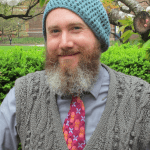 Lyle Murphy is a freelance folklorist, artist, videographer and exhibit developer based in Harrisonburg, Virginia. He is a former exhibit developer at the UO’s Museum of Natural and Cultural History. As an artist and a folklorist, he has witnessed the powerful perceptual changes that fieldwork, public programming, art, and exhibits can have on communities.
Lyle Murphy is a freelance folklorist, artist, videographer and exhibit developer based in Harrisonburg, Virginia. He is a former exhibit developer at the UO’s Museum of Natural and Cultural History. As an artist and a folklorist, he has witnessed the powerful perceptual changes that fieldwork, public programming, art, and exhibits can have on communities.
Kari Norgaard
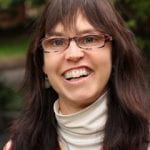 Kari Norgaard is Associate Professor of Sociology and Environmental Studies at University of Oregon. Over the past ten years Dr. Norgaard has published and taught in the areas of environmental sociology, gender and environment, race and environment, climate change, sociology of culture, social movements and sociology of emotions. She currently has two active areas of research: work on the social organization of denial (especially regarding climate change), and environmental justice work with Native American Tribes on the Klamath River. She is author ofSalmon and Acorns Feed Our People: Colonialism, Nature and Social Action (2019) and Living in Denial: Climate Change, Emotions and Everyday Life (2011).
Kari Norgaard is Associate Professor of Sociology and Environmental Studies at University of Oregon. Over the past ten years Dr. Norgaard has published and taught in the areas of environmental sociology, gender and environment, race and environment, climate change, sociology of culture, social movements and sociology of emotions. She currently has two active areas of research: work on the social organization of denial (especially regarding climate change), and environmental justice work with Native American Tribes on the Klamath River. She is author ofSalmon and Acorns Feed Our People: Colonialism, Nature and Social Action (2019) and Living in Denial: Climate Change, Emotions and Everyday Life (2011).
Myra Johnson-Orange
Myra Johnson-Orange, an enrolled Tribal Member with the Confederated Tribes of Warm Springs is of Northern Paiute and Wanalama descent. She currently is the Chairperson for the Culture & Heritage Committee who directly works under the Tribal Council. She may be retired, however maintains a busy schedule working for her tribe and her people. She has worked with University of Oregon Honors College, Washington State University, Northwest Native American Basket Weavers Association, US Forest Services, US Corp of Engineers to name a few.
Her longest term of work was the Culture and Heritage Program, where her first task was to develop a language program for the tribe. She then moved up to Director of the program and started the movement towards the State Certification of Native Language Teachers-Senate Bill 690, amongst other accomplishments. Today she continues her work on the research and development of information for the Northern Paiute curriculum for Senate Bill 13. Northern Paiute is one of the Tribes where there is minimum information of their history. She believes this is a much-needed curriculum for those who have little knowledge of the 9 Tribes of Oregon and their histories. Her greatest pride and joy today is her family; husband, Virgil, 6 children, 28 grandchildren, and 12 great grandchildren, with one more due soon.
Jennifer O’Neal
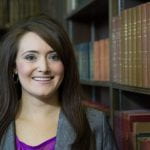 Jennifer O’Neal is Acting Assistant Professor in Indigenous, Race, and Ethnic Studies. She specializes in American West and Native American history, with a specific emphasis on decolonizing methodologies, social movements, and race relations. Her research and teaching is dedicated to the intersections between the social and cultural contexts that marginalized or underrepresented communities are represented in history and the archive, with a specific focus on Native American history and American West history in the 19th and 20th century. Within the Honors College and Ethnic Studies, O’Neal developed undergraduate courses engaging students in decolonizing pedagogy and community based-research with indigenous community course partners to document the often hidden histories of Oregon’s tribal communities. Her work is also dedicated to developing frameworks and guidelines for the post-custodial and collaborative stewardship of cultural heritage collections in partnership with source community members.
Jennifer O’Neal is Acting Assistant Professor in Indigenous, Race, and Ethnic Studies. She specializes in American West and Native American history, with a specific emphasis on decolonizing methodologies, social movements, and race relations. Her research and teaching is dedicated to the intersections between the social and cultural contexts that marginalized or underrepresented communities are represented in history and the archive, with a specific focus on Native American history and American West history in the 19th and 20th century. Within the Honors College and Ethnic Studies, O’Neal developed undergraduate courses engaging students in decolonizing pedagogy and community based-research with indigenous community course partners to document the often hidden histories of Oregon’s tribal communities. Her work is also dedicated to developing frameworks and guidelines for the post-custodial and collaborative stewardship of cultural heritage collections in partnership with source community members.
Paul Peppis
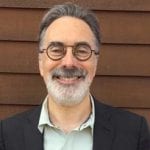 Paul Peppis, Professor of English, and Director of the Oregon Humanities Center, is the author of two monographs, Sciences of Modernism: Ethnography, Sexology, and Psychology (Cambridge 2014) and Literature, Politics, and the English Avant-Garde (Cambridge 2000). His other publications include “Salvaging Dialect and Cultural Cross-Dressing in Claude McKay’s Constab Ballads,” Twentieth Century Literature 59.1 (spring 2013); “Schools, Movements, Manifestoes,” Cambridge Companion to Modernist Poetry, eds. Alex Davis and Lee Jenkins (Cambridge, 2007); “Forster and England,” Cambridge Companion to E. M. Forster, ed. David Bradshaw (Cambridge, 2007); “Rewriting Sex: Mina Loy, Marie Stopes, and Sexology” Modernism/Modernity 9.4 (November 2002); “Thinking Race in the Avant guerre: Typological Negotiations in Ford and Stein,” Yale Journal of Criticism 10.2 (1997); “Surrounded by a multitude of other Blasts: Vorticism and the Great War,” Modernism/Modernity 4.2 (April 1997); “New Approaches to Nationalism,” Modernism/Modernity 2.1 (January 1995); “Anti-Individualism and the Fictions of National Character in Wyndham Lewis’s Tarr,” Twentieth Century Literature 40.2 (Summer 1994).
Paul Peppis, Professor of English, and Director of the Oregon Humanities Center, is the author of two monographs, Sciences of Modernism: Ethnography, Sexology, and Psychology (Cambridge 2014) and Literature, Politics, and the English Avant-Garde (Cambridge 2000). His other publications include “Salvaging Dialect and Cultural Cross-Dressing in Claude McKay’s Constab Ballads,” Twentieth Century Literature 59.1 (spring 2013); “Schools, Movements, Manifestoes,” Cambridge Companion to Modernist Poetry, eds. Alex Davis and Lee Jenkins (Cambridge, 2007); “Forster and England,” Cambridge Companion to E. M. Forster, ed. David Bradshaw (Cambridge, 2007); “Rewriting Sex: Mina Loy, Marie Stopes, and Sexology” Modernism/Modernity 9.4 (November 2002); “Thinking Race in the Avant guerre: Typological Negotiations in Ford and Stein,” Yale Journal of Criticism 10.2 (1997); “Surrounded by a multitude of other Blasts: Vorticism and the Great War,” Modernism/Modernity 4.2 (April 1997); “New Approaches to Nationalism,” Modernism/Modernity 2.1 (January 1995); “Anti-Individualism and the Fictions of National Character in Wyndham Lewis’s Tarr,” Twentieth Century Literature 40.2 (Summer 1994).
Ron Reed
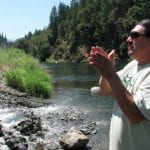 A co-founder of the Karuk-UC Berkeley Collaborative, tribal member Ron Reed is a traditional Karuk dipnet fisherman and a cultural biologist for the Karuk Tribe of California. He works for the Karuk Tribe of California’s Department of Natural Resources as their Cultural Biologist. In his role, Ron develops plans for eco-cultural revitalization, leads youth cultural education camps, and fosters collaborative research at the nexus of traditional ecological knowledge and western science. Ron plays a critical role in increasing public awareness about the impacts of colonization on the spiritual and physical health of his people and on the ecological integrity of the Karuk ancestral lands.
A co-founder of the Karuk-UC Berkeley Collaborative, tribal member Ron Reed is a traditional Karuk dipnet fisherman and a cultural biologist for the Karuk Tribe of California. He works for the Karuk Tribe of California’s Department of Natural Resources as their Cultural Biologist. In his role, Ron develops plans for eco-cultural revitalization, leads youth cultural education camps, and fosters collaborative research at the nexus of traditional ecological knowledge and western science. Ron plays a critical role in increasing public awareness about the impacts of colonization on the spiritual and physical health of his people and on the ecological integrity of the Karuk ancestral lands.
Geoffrey Rockwell
 Geoffrey Rockwell is a Professor of Philosophy and Humanities Computing at the University of Alberta. He has published on textual visualization and analysis, and computing in the humanities including a book Hermeneutica: Computer-Assisted Interpretation in the Humanities (2016). Rockwell is a co-developer of Voyant Tools, a suite of text analysis tools, and leads the TAPoR project documenting text tools. He is currently the Director of the Kule Institute for Advanced Study and blogs at theoreti.ca.
Geoffrey Rockwell is a Professor of Philosophy and Humanities Computing at the University of Alberta. He has published on textual visualization and analysis, and computing in the humanities including a book Hermeneutica: Computer-Assisted Interpretation in the Humanities (2016). Rockwell is a co-developer of Voyant Tools, a suite of text analysis tools, and leads the TAPoR project documenting text tools. He is currently the Director of the Kule Institute for Advanced Study and blogs at theoreti.ca.
Sarah Salcedo
 Sarah Salcedo is an author, screenwriter, producer, and filmmaker from Seattle, Washington. She is originally from Fremont, California. She is married to and collaborates with her Promised Land (2016) co-director, Vasant Salcedo. She also collaborates with her sister, Claire Salcedo, who is the composer for Promised Land and is a playwright and author.
Sarah Salcedo is an author, screenwriter, producer, and filmmaker from Seattle, Washington. She is originally from Fremont, California. She is married to and collaborates with her Promised Land (2016) co-director, Vasant Salcedo. She also collaborates with her sister, Claire Salcedo, who is the composer for Promised Land and is a playwright and author.
Vasant Salcedo
 Vasant Salcedo is an editor, motion graphic designer, director, and cinematographer. He has been making videos for the last decade and a half around the globe for non-profits. The Salcedos are a filmmaking partnership based in the Pacific Northwest. They have been writing and filming together for the past decade and Promised Land is their first feature.
Vasant Salcedo is an editor, motion graphic designer, director, and cinematographer. He has been making videos for the last decade and a half around the globe for non-profits. The Salcedos are a filmmaking partnership based in the Pacific Northwest. They have been writing and filming together for the past decade and Promised Land is their first feature.
Fawn R. Sharp
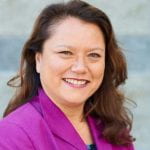 Fawn R. Sharp is the President of the Quinault Indian Nation (2006-current) and President-elect of the National Congress of American Indians; an attorney with an academic background in criminal justice, she holds an advanced certificate in International Human Rights Law from Oxford University. President Sharp formerly served as Managing Attorney/Lead Counsel/and Associate Judge for the Quinault Indian Nation government. She also served as an Administrative Law Judge for the Washington State Department of Revenue Tax Appeals Division. While president of the Quinault Indian Nation, Fawn Sharp was elected as President of the Affiliated Tribes of Northwest Indians (ATNI 2001-2017); Vice President for the National Congress of American Indians (NCAI) an organization established in 1944 representing 566 Tribal Nations (2016-2017); We Are Still In Leader Circle (WASI) member (2018-present). She completed two years of service as Chairman of the United States Department of the Interior Secretarial Commission on Indian Trust Administration and Reform that issued its final report in December 2013.
Fawn R. Sharp is the President of the Quinault Indian Nation (2006-current) and President-elect of the National Congress of American Indians; an attorney with an academic background in criminal justice, she holds an advanced certificate in International Human Rights Law from Oxford University. President Sharp formerly served as Managing Attorney/Lead Counsel/and Associate Judge for the Quinault Indian Nation government. She also served as an Administrative Law Judge for the Washington State Department of Revenue Tax Appeals Division. While president of the Quinault Indian Nation, Fawn Sharp was elected as President of the Affiliated Tribes of Northwest Indians (ATNI 2001-2017); Vice President for the National Congress of American Indians (NCAI) an organization established in 1944 representing 566 Tribal Nations (2016-2017); We Are Still In Leader Circle (WASI) member (2018-present). She completed two years of service as Chairman of the United States Department of the Interior Secretarial Commission on Indian Trust Administration and Reform that issued its final report in December 2013.
Jimmy Snyder
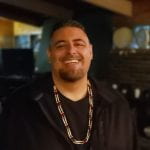 Jimmy Snyder is a 4th year PhD candidate in the Critical and Sociocultural Studies in Education program at the University of Oregon. He is a citizen of the Kickapoo Tribe in Kansas. He is a 2009 graduate of the UO Sapsik’ʷałá master degree program and has a history degree from the University of Kansas. He has 20 years’ experience working in tribal communities (in tribal college and reservation schools). Snyder has also taught social studies on the Kickapoo and Navajo reservations. Most recently he was an Education Administrator for the New Mexico Public Education Department within the Indian Education Division. Research interests include teacher education, social studies methods, Indigenous studies, Indigenous theory and methodologies, projects with young men of color, and qualitative research methods.
Jimmy Snyder is a 4th year PhD candidate in the Critical and Sociocultural Studies in Education program at the University of Oregon. He is a citizen of the Kickapoo Tribe in Kansas. He is a 2009 graduate of the UO Sapsik’ʷałá master degree program and has a history degree from the University of Kansas. He has 20 years’ experience working in tribal communities (in tribal college and reservation schools). Snyder has also taught social studies on the Kickapoo and Navajo reservations. Most recently he was an Education Administrator for the New Mexico Public Education Department within the Indian Education Division. Research interests include teacher education, social studies methods, Indigenous studies, Indigenous theory and methodologies, projects with young men of color, and qualitative research methods.
Esther Stutzman
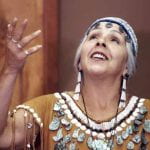 Esther Stutzman is Coos and Komemma Kalapuya and is an enrolled member of the Confederated Tribes of Siletz Indians. Esther is a storyteller and history keeper. She tells only Coos and Kalapuya stories. Her grandmother told her that it was bad luck to tell other people or other tribes’ stories. Stories are regarded as private property, as are songs. She has thirteen stories she shares with the public. Some of her creation stories tell of the time when animals and people could talk together. Esther published a book of traditional Coos stories in 1997. It was printed on an old historic press in Bandon, Oregon. She was a curriculum developer for K-12 in Coos Bay, Oregon and works with Indian education programs. She has also worked with the Oregon Folklife Council at the Oregon Historical Society, the Applegate House Heritage Arts and Education in Yoncalla, Oregon, and as a board member of the McKenzie River Gathering Foundation.
Esther Stutzman is Coos and Komemma Kalapuya and is an enrolled member of the Confederated Tribes of Siletz Indians. Esther is a storyteller and history keeper. She tells only Coos and Kalapuya stories. Her grandmother told her that it was bad luck to tell other people or other tribes’ stories. Stories are regarded as private property, as are songs. She has thirteen stories she shares with the public. Some of her creation stories tell of the time when animals and people could talk together. Esther published a book of traditional Coos stories in 1997. It was printed on an old historic press in Bandon, Oregon. She was a curriculum developer for K-12 in Coos Bay, Oregon and works with Indian education programs. She has also worked with the Oregon Folklife Council at the Oregon Historical Society, the Applegate House Heritage Arts and Education in Yoncalla, Oregon, and as a board member of the McKenzie River Gathering Foundation.
Janne Underriner
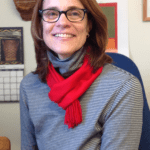 Janne Underriner is the Director of the Northwest Indian Language Institute (NILI). She has been active with language preservation issues in the Northwest since 1996 when she began working with Elders in the Klamath Tribes’ language project developing curriculum and teaching materials for their community and schools. She co-founded NILI in 1997. Underriner assists the tribes in developing language programs, writing curriculum, assessment and teaching materials and developing language policy. She worked with the Tribes to develop the NW Indian Language Benchmarks (2000), the American Indian Language Teaching License (2001) and Native language policy in the Oregon University System (2011). Her research focuses on the relationship between language, culture and health; second language acquisition of Indigenous languages; and the pragmatics of word order flexibility. She teaches Chinuk Wawa.
Janne Underriner is the Director of the Northwest Indian Language Institute (NILI). She has been active with language preservation issues in the Northwest since 1996 when she began working with Elders in the Klamath Tribes’ language project developing curriculum and teaching materials for their community and schools. She co-founded NILI in 1997. Underriner assists the tribes in developing language programs, writing curriculum, assessment and teaching materials and developing language policy. She worked with the Tribes to develop the NW Indian Language Benchmarks (2000), the American Indian Language Teaching License (2001) and Native language policy in the Oregon University System (2011). Her research focuses on the relationship between language, culture and health; second language acquisition of Indigenous languages; and the pragmatics of word order flexibility. She teaches Chinuk Wawa.
